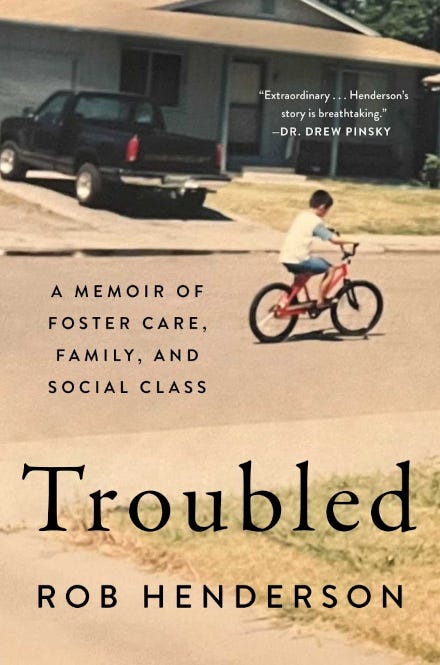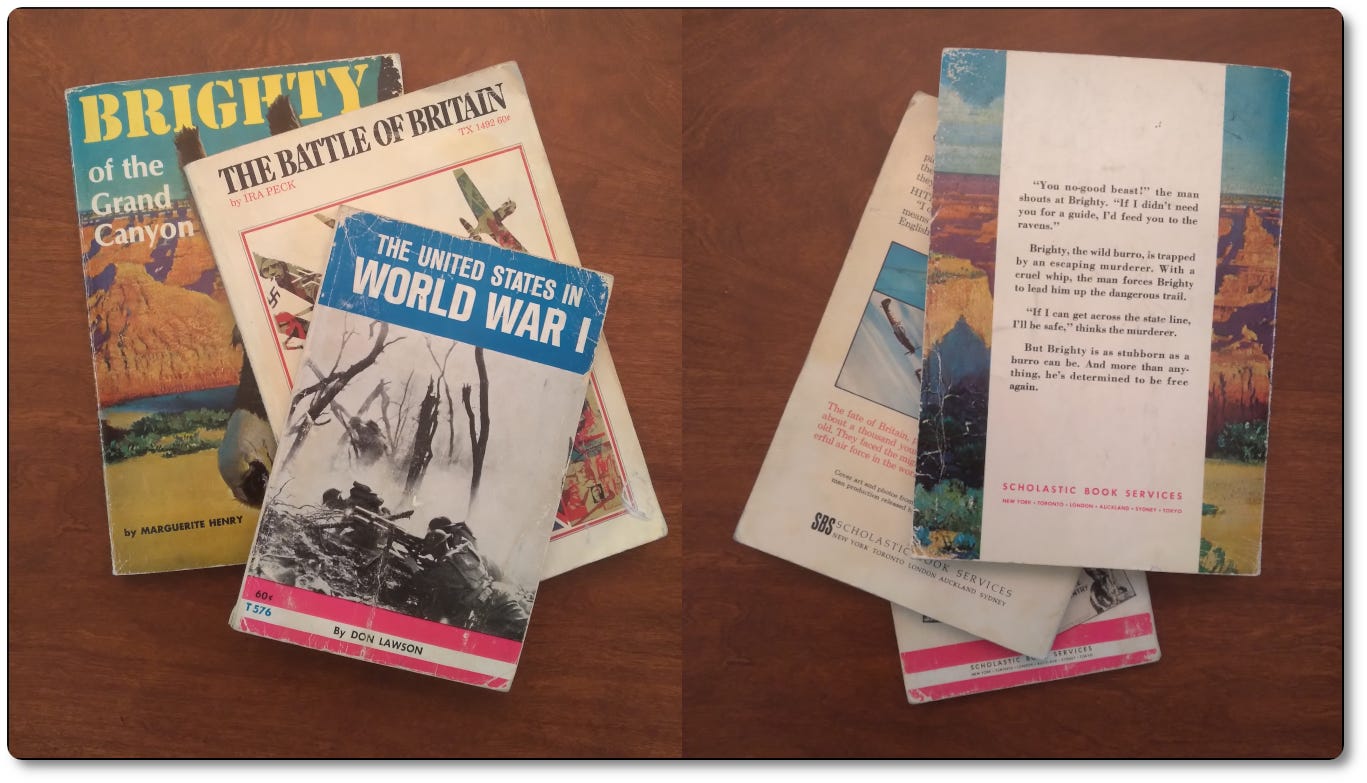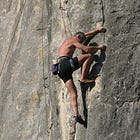Reflections on Rob Henderson's book, "Troubled"
"Some of the biggest cases of mistaken identity are among intellectuals who have trouble remembering that they are not God." - Thomas Sowell
There are two things that might draw me into reading an auto/biography or memoir - interest in the historical context or curiosity about how the subject of the book overcame challenges similar to or worse than mine. I've read many more books related to the former than the latter. Indeed, the older and more experienced I became the less frequent the need or desire to read about someone else's difficulties.
In recent years I've been reaching further back in time to understand more about what I experienced and learned during my earliest years. Prior to now, the past had always been something to "put behind me" and move on. Too many bad memories, if dwelled upon, can cripple how we think about the future. There is an insulating quality, however, that comes with age that makes it easier to think about the past more dispassionately. I'm beyond the reach of many of the bad actors from that time and I can look back with much more capable eyes and evaluate experiences and lessons.
But what to look for? Why do the lessons from many of my childhood experiences seem clear while other experiences have left me confused, perplexed, angry, sad, or even afraid? In these cases, I still look to the experiences of others and how they have managed to sort meaning from mess. A standout in this regard is Rob Henderson's book, "Troubled."
I had intended to write a review of "Troubled" after reading it. However, "Troubled" ended up being more provocative and evocative than anticipated. Consequently, this post doesn't qualify as a review as such since I'm reflecting on how Henderson's story has illuminated aspects of my own life. Suffice it to say "Troubled" is well worth reading, not just for Henderson's story, but for his cogent insights into human behavior and present day issues. I don't think Henderson would begrudge this approach.
I first became aware of Rob Henderson around the time his idea of luxury beliefs began to gain traction. His framing of luxury beliefs are as brilliant as they are concise. Perhaps to be expected from someone with degrees from Yale and Cambridge. From his writing and numerous interviews, I anticipated someone with a few more years under his belt. But as I learned more about his difficult history, the more I became interested in what experiences he had, how he processed events, and how he matured along the way. All the more impressive that his insights come at the relatively young age of 30 years. So when his memoir had a publication date, I pre-ordered.
To be clear, Henderson's early life was much, much worse than mine. The price he paid for the lessons he learned was significantly greater. The contrast between his story and mine, however, made it easier for me to separate and sort the tangled parts of many of my early life experiences. Although much of my childhood was unpleasant, the new perspectives allowed me to gain an appreciation and gratitude for many positive experiences that had been captured by the intense negative experiences.
There are several elements on which our stories intersect. Neither of us enjoyed a "parent premium," we struggled with caregiver attachment issues resulting in fear for safety, and we grew up fast. The intersect I want to mention with a little detail is that we were both voracious readers in our youth and for similar reasons. In "Troubled," Henderson notes that he "was drawn mostly to memoirs by people who had lived tough lives" and when feeling down, he found it "soothing to read about others who had experienced hardship and found ways to rise above it." Books were an accessible way to escape the vicissitudes of the here and now.
Whether a biography or fiction, key to this interest was the connection between the hardship and how the subject found a way forward. Monster and horror stories with gratuitous carnage, magical pedigrees, and improbable resolutions weren't attractive. Frodo Baggins, yes. Harry Potter, no. In my case, I read a lot of history, particularly military history. As a young boy, WWII was a mere 25 years in the past - about the same timespan between 9/11 and now - and the Vietnam war was in full bloom. There were plenty of worthy adults around with stories about their experiences in the service and so no lack of living heroes who had overcome incredible odds and survived. This cadre of worthy male models appears to be another advantage I had compared to Henderson's experiences.
Henderson's mention of the Scholastic Book Services, in particular, brings back some very good memories. I still have the very first book I genuinely owned, purchased in the third grade from Scholastic Book Services with money I earned helping a neighbor dig out a tree stump, "The United States in World War I."
In elementary school, about once or twice a year, student's could order books from a catalog and a thousand third-grader-years later a magical box would arrive with our books. I remember savoring the anticipation. Quite a different experience from too many of the Kindle impulse purchases I've made. Of late, I've focused more on library books. I'm finding the anticipation from having a book on hold for several weeks to be similar to the wait time for the Scholastic Book Services orders.
My military interests also took me further back into history and eventually lead to the discovery of Marcus Aurelius and the Stoics. Their words would ultimately guide me through a particularly rough patch as I entered my teenage years.
What made Henderson's early life so much more difficult than mine was the degree of instability and unpredictability he experienced with respect to adult supervision and guidance. Having grown up as he did in low income foster homes among adults struggling with their own issues, Henderson notes:
Unstable environments and unreliable caregivers aren’t bad for children because they reduce their future odds of getting into college or making a living; they are bad because the children enduring them experience pain—pain that etches itself into their brains and bodies and propels them to do things in the pursuit of relief that often inflict even more harm. Credentials and money are not antidotes to the lingering effects of childhood maltreatment.
Elaborating on this point:
"For children, having a stable environment with two parents who implement rules, provide attentive care, and cultivate a sense of security goes a long way. Even when you present opportunities to deprived kids, many of them will decline them on purpose because, after years of maltreatment, they often have little desire to improve their lives."
Reflecting on this, I was able to appreciate the elements of stability my parents provided - my address never changed, my schools never changed, there was a regular cadence to holidays and school years, and my parents remained married until my father's death at age 87. There was also structure and predictability. Even though the structure was oppressive in nature and my father's rage and anger were the most salient points of prediction, they were nonetheless familiar day-to-day.
Unlike Henderson, my siblings and I had no taste for risk or challenging boundaries until we'd grown past our mid-teens. As a consequence, we had no issues with drug or alcohol abuse. In a sense, the military-esque discipline enforced by my father provided the rudimentary structure Henderson describes with his military experience. It wasn't an enriching experience, but it would seem to have been better than the unpredictable free range childhood Henderson had in his youth.
Henderson elaborates on the distinction:
"An important clue comes from a widely cited 2012 paper in the scientific journal Developmental Psychology. A team of psychologists found that compared to children raised in wealthier families, children raised in lower-income families are no more likely to engage in risky behaviors or commit crimes as adults. However, compared with children raised in stable environments, children raised in unstable environments are significantly more likely to engage in harmful or destructive behaviors later in life. Holding family income constant, the researchers found that the association between childhood instability and harmful behaviors in adulthood remained significant. Plainly, being poor doesn’t have the same effect as living in chaos."
My experience matches what this research found. With eight children to care for, my parents certainly fell in the low-income bracket. I remember how scarce food was in the days that led up to mom's paydays. I remember being on the free-lunch program at school and handing over bright orange lunch tickets, rather than the regular green tickets, which helpfully pointed out to everyone we couldn't afford to pay for lunches. But compared to Henderson, home life was stable and the behaviors we engaged in were pretty tame. We knew the boundaries and we knew the consequences of crossing or even approaching them. Our actions were tempered by the fear of dad's wrath were he to find out about transgressions.
Where our lessons converge again, albeit by different paths, is with the relationship we forged with ourselves.
"If you want to gauge your relationship with yourself and your life, put everything aside and just be alone with your thoughts. Sitting silently in rehab—no alcohol, no phone, no distractions—I found a mountain of unresolved inner pain. I pursued hyperstimulation as a kid to avoid those feelings. The drinking and drugs, the choking game, the bursts of adrenaline that came with putting myself in dangerous situations. Now, I was going through withdrawal. Not just from alcohol, but from every kind of “buzz” I’d sought as a kid."
I did similar work, absent the effects of physical withdrawal, in Buddhist monasteries. There are many paths toward wisdom.
An afterthought from having read "Troubled" was the directionality of Henderson's story. I see a similar thread in my own experience as well as that of other's who have encountered great struggles in their life. It's the life trajectory reflected in "Troubled," and the effort it takes to overcome such inauspicious beginnings, that leads to keen insights into the degree of unconscious detachment in the lives of affluent and highly educated families. As self-absorbed as so much of the 1%'ers are, they really have very little insight into how noxious they are to the other 99%.
Undoubtedly, there are stories that go in the other direction. Stories about someone high and mighty, oozing money and opulence, who falls from the Ivory Tower. Even then, the interest is in what they did to get back on their feet, assuming they actually did pull themselves up and weren't rescued by family money. The occasional story of some wealthy person slumming with the local peasants on a lark or out of curiosity doesn't count. Visiting the bottom isn't the same as hitting the bottom.
There is much more I could reflect on and "Troubled" will undoubted be a book on the re-read list, particularly the ending chapters. On first read, however, even though the real meat and enduring value of Henderson's story can be found in chapters 11 and 12, the value of the later chapters cannot be fully appreciated without understanding the background laid out in the preceding ten chapters. Having done so, you'll better appreciate the value of his present day insights. I give the last word to Henderson:
"We now live in a culture where affluent, educated, and well-connected people validate and affirm the behaviors, decisions, and attitudes of marginalized and deprived kids that they would never accept for themselves or their own children. And they claim to do this in the name of compassion."
Related Articles
If you have any questions, need anything clarified, or have something else on your mind, please send a DM or email me directly.











Thank you for sharing.
Love this, Gregory, thank you for sharing these insights into your life and this book which is now on my Libby app (I too love the wait and the delight of getting notified I can borrow one of the books on my list). It was eye-opening to learn about the different colors for lunch vouchers. Clearly a case of process- , not user-centric design...